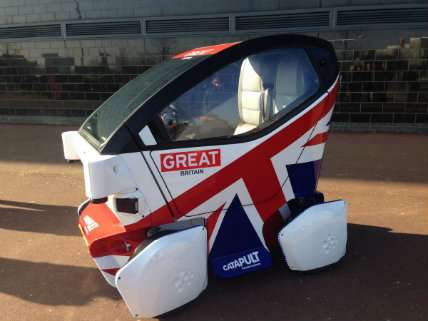Britain Launches Multiple Driverless Car Tests, Plans Regulatory Overhaul
The UK wants driverless cars on the road without onerous rules.

Britain just launched a test-run for its first driverless car, the tiny, adorably British LUTZ Pathfinder, a two-seat vehicle made by Transport Systems Catapult.
The car is being tested in London, but it won't be racing on any roads: It has a top speed of just 15 miles per hour, and is designed to ride the sidewalks. The car roams the roadside using 19 sensors, including lasers, radar, and wide-angle cameras, according to Popular Science, which also reports that Catapult plans to launch an Uber-like car-hailing service for folks who want a ride.
The LUTZ rollout is part of the UK's big push into driverless car technology. As the BBC notes, the nation is set to fund four different driverless vehicle tests, following an announcement by the Department of Transport that it would rewrite the current Highway Code in order to make way for testing, and begin work on a full review of legal issues surrounding automated transport.
Overall, the UK approach looks remarkably free and tech-friendly, especially, as this Wired report suggests, in comparison to the United States:
The United Kingdom just became the best place on earth to develop self-driving cars. Yes, the land of extortionist gas taxes and intense emissions regulations, where you have to pay extra money just to get your car into central London, is taking what amounts to an anything-goes approach to real-world testing of autonomous driving technology. It's placing no geographical limitations on tests, not requiring special licenses or permits, and even opting not to require additional insurance.
Meanwhile, in Land of the Free, efforts to regulate driverless cars have resulted in an ungainly and complicated patchwork of rules. The few states that have laid down laws each require their own combination of special training for test drivers, examinations by the DMV, and out of the ordinary license plates. The federal government is behind its own deadlines for offering national guidance.
"The aim is to achieve a light-touch, non-regulatory approach which provides the clarity industry needs to invest in further research and development while maintaining safety," the Department for Transport said in a report published Wednesday. And that's got to sound good to the automakers like Audi and tech companies like Google who hope to make driving passé.
Indeed.
Editor's Note: As of February 29, 2024, commenting privileges on reason.com posts are limited to Reason Plus subscribers. Past commenters are grandfathered in for a temporary period. Subscribe here to preserve your ability to comment. Your Reason Plus subscription also gives you an ad-free version of reason.com, along with full access to the digital edition and archives of Reason magazine. We request that comments be civil and on-topic. We do not moderate or assume any responsibility for comments, which are owned by the readers who post them. Comments do not represent the views of reason.com or Reason Foundation. We reserve the right to delete any comment and ban commenters for any reason at any time. Comments may only be edited within 5 minutes of posting. Report abuses.
Please to post comments


Someone here said 1000 years.
I think 10 might be pessimistic.
Britain Launches Multiple Driverless Car Tests, Plans Regulatory Overhaul
Somehow, when you put that under "Hit & Run"...
It will get out of control and we'll be lucky to live through it.
You want to kill driverless cars? Make em just like that one.
Wow! 15 MPH and looks like a shrunken Bond prop.
Gonna. Sell. Like. HOTCAKES.
*smirks at a mental image*
The UK wants driverless cars on the road without onerous rules.
Because that means they can switch to driving on the correct side of the road with minimal fuss. They know how ridiculous they're being.
You heard it here first.
Either that or they'll need driverless cars to replace all of the men who will soon be in jail for failing to obtain durable proof of freely and knowingly given consent for sex.